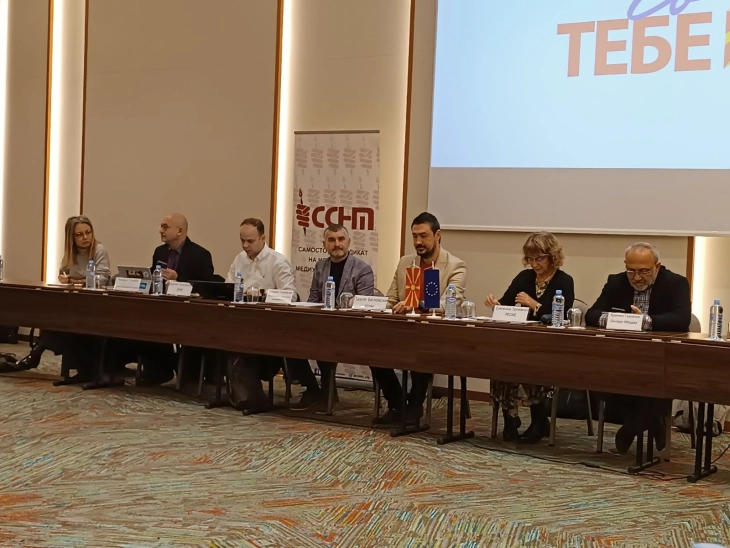SSNM, AJM call for new media law
- The Independent Trade Union of Journalists and Media Workers (SSNM), the Association of Journalists of Macedonia (AJM) and the RESIS Institute organized on Monday a panel discussion stressing the need for a new media law to be fully aligned with European legislation. Amendments to the Law on Media are currently being drafted, generally applying to online media, regarding which media stakeholders, organizations and the AVMU have sent comments.

Skopje, 2 December 2024 (MIA) - The Independent Trade Union of Journalists and Media Workers (SSNM), the Association of Journalists of Macedonia (AJM) and the RESIS Institute organized on Monday a panel discussion stressing the need for a new media law to be fully aligned with European legislation. Amendments to the Law on Media are currently being drafted, generally applying to online media, regarding which media stakeholders, organizations and the AVMU have sent comments.
SSNM President Pavle Belovski said the Union and AJM are proposing a new legal solution because all the amendments cannot be included in the current one, adding that a new media law is needed.
"The regulations require that we have a new media law. The main things that need to be incorporated in this legal solution are the inclusion and registration of online media, i.e. recognition through the definition itself, and then also in all articles. The most important thing for us in the union is that in the future such a new solution guarantees all the working conditions, i.e. the European Media Freedom Act (EMFA). And if we want to get where we are going, we must quickly and urgently, in collaboration with the Ministry of Digital Transformation, develop a new legal solution.
"This is where we should start, but we should not stop at the amendments to the AVMU, as one of the main laws that regulate our work, and I hope that in the near future we will also have a law on MIA, as well as amendments to the law on MRTV, where once and for all together with the Law on Labour Relations and the by-laws, the general and special collective agreements, we will put order in this profession. But without a law on MIA, we cannot talk about a regulated profession," said Belovski.
Commenting on a comprehensive analysis conducted last year, as well as the need for alignment with European legislation, professor Snezhana Trpevska from the RESIS Institute said work is necessary on a new media law that would strengthen provisions on editorial independence, guarantee media pluralism, i.e. citizens' access to diverse media content, as well as strengthen the working status, safety and independence of journalists in the newsrooms.
"The Government's program for this year contains one point - alignment of media legislation with the latest EU regulations. We need a completely new media law. This is required by the regulation on media freedom, which we want to align with next year. The main points in the law should be to strengthen the provisions that will safeguard editorial independence, guarantee media pluralism or citizens' access to diverse media content. According to the EMFA, editorial policy should be efficient, independent, and effective in practice, therefore the third point in that law should be strengthening the working status and independence of journalists in newsrooms, and the fourth should be strengthening the safety of journalists, particularly safety in the context of unauthorized surveillance of journalists, and particularly journalists engaged in investigative work using new technologies," said Trpevska.

Ricardo Gutiérrez, General Secretary of the European Federation of Journalists (EFJ), who is in Skopje visit to hold meetings with representatives of the Government, organizations and media, stressed that there is no doubt that online media must be included in the laws and that the legislation should be aligned with the European one, starting with the European Media Freedom Act (EMFA), which has a precise definition of what a media service provider is.
"Specifically, the articles (of the laws) should refer not to a single medium, but to media service providers. What is a media service provider? The definition in the media freedom act is clear - it is a natural or legal person whose professional activity is to provide a media service and who has editorial responsibility for the choice of the content of the media service and determines the manner in which it is organized. The EU act does not distinguish between printed, presented content of broadcasters and online media," said Gutiérrez.
The media law, he noted, must not be discriminatory in any way, especially by preventing the recognition of local media, non-profit media, or community media.
"It should also be clear that the articles relating to online media will not be enough. Macedonia has an obligation to implement all provisions of the EMFA by August 2025. That leaves eight months for a complete overhaul of all laws pertaining to the media. My recommendation to the Government and the Parliament is to immediately start discussions with the AJM and the SSNM on all these laws," Gutiérrez said.
Mishko Talevski, a representative of the Ministry of Digital Transformation, pointed out that at the Ministry's proposal, the Government's Plan for 2025 included adopting a new media law. In the meantime, comments have been received from all stakeholders regarding the amendments to the current media law. According to him, the media need less regulation and more self-regulation.
Commenting on the amendments to the Law on Media, journalist Branko Geroski, as a representative of Online Media, said they were basically good, there were certain weaknesses, but those weaknesses will be resolved in the draft that will be sent to the Parliament. Geroski said that with the current status, online media are in the so-called 'gray zone' and that this is no longer sustainable.
Representatives of AJM, AVMU and other media organizations also addressed the debate.
Photo: MIA







